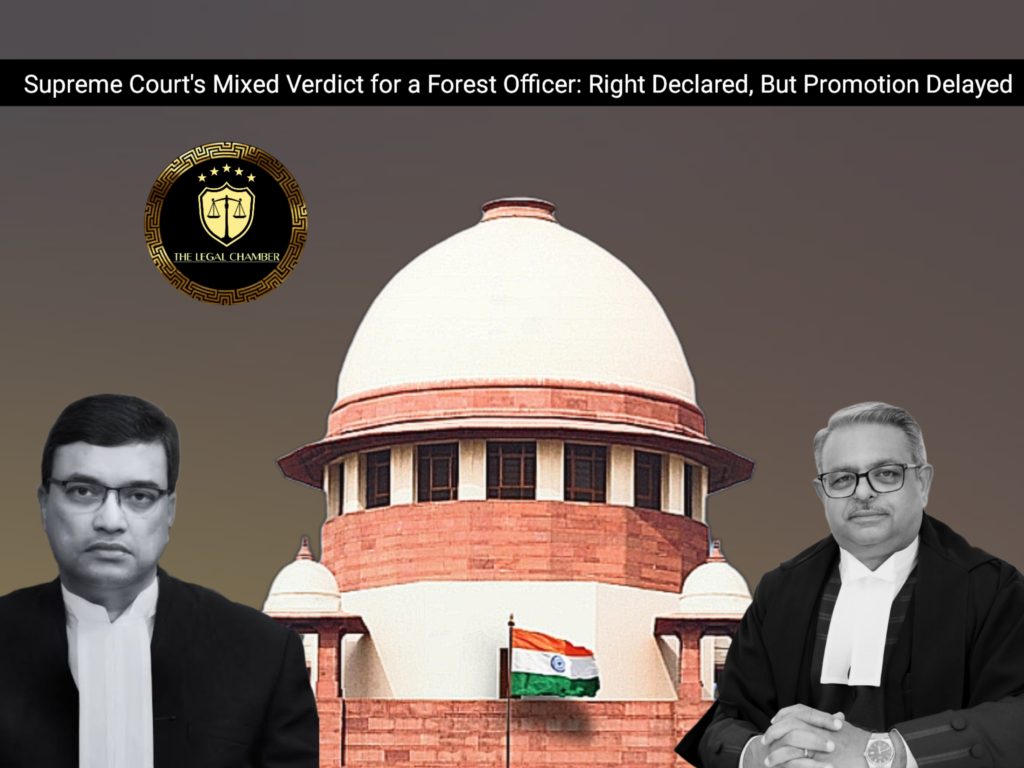
Facts Of The Case:
The appellant, P. Maruthi Prasada Rao, was appointed as a Forest Range Officer (FRO) in 2006. In 2021, he petitioned the authorities, arguing that FROs should be considered part of the “State Forest Service” and thus be eligible for promotion to the Indian Forest Service (IFoS) when sufficient numbers of senior officers like Deputy Conservators of Forests (DCFs) and Assistant Conservators of Forests (ACFs) were not available.When his representation went unaddressed, he approached the Central Administrative Tribunal (CAT). The CAT ruled in his favour, directing the state to treat FROs as State Forest Service officers and consider them for IFoS promotion. The State of Andhra Pradesh challenged this decision in the High Court, which reversed the CAT’s order. The High Court held that the FRO post was not a “State Forest Service” as defined under the relevant rules because it lacked specific approval from the Central Government.The appellant then appealed to the Supreme Court. The core legal dispute centred on interpreting the definition of “State Forest Service” and whether the required central government approval pertains to the entire state service or to individual posts within it. The Supreme Court’s judgment addressed this fundamental question of law.
Procedural History:
The procedural history of this case began when the appellant, P. Maruthi Prasada Rao, filed an original application before the Central Administrative Tribunal (CAT), Hyderabad Bench. The CAT, in its order dated April 12, 2022, ruled in his favour, directing the respondents to treat Forest Range Officers (FROs) as State Forest Service officers and consider them for promotion to the Indian Forest Service.The State of Andhra Pradesh and other respondents challenged the CAT’s decision by filing a writ petition (W.P. No. 29304 of 2022) in the High Court of Andhra Pradesh. The High Court, vide its judgment and order dated December 22, 2023, allowed the writ petition, setting aside the CAT’s order and holding that FROs were not eligible for such promotion.Aggrieved by the High Court’s reversal, the appellant approached the Supreme Court of India by filing a Special Leave Petition (SLP(C) No.1253 of 2024). The Supreme Court granted leave, and the matter was heard as a Civil Appeal. The Supreme Court’s judgment, dated August 22, 2025, ultimately set aside the High Court’s order, culminating the litigation.
READ ALSO:Supreme Court Rules in ₹300 Bribe Case ,Mental Agony of Protracted Trial Grounds for Leniency
Court Observation:
In its observations, the Supreme Court clarified the central legal issue, holding that the approval of the Central Government under Rule 2(g)(i) of the Indian Forest Service (Recruitment) Rules, 1966, pertains to the entire service and not to individual posts. The Court found that the Andhra Pradesh Forest Service, which includes gazetted officers like Forest Range Officers, qualifies as a ‘State Forest Service’ if approved. However, the Court also emphasized the principles of timely litigation from P.S. Sadasivaswamy v. State of T.N., noting the appellant’s significant delay in raising his grievance. Consequently, while the appellant succeeded on the legal declaration of eligibility, he was denied retrospective relief or immediate promotion, as he could not jump the queue ahead of his seniors for past vacancies. The Court directed that his candidature be considered only in future recruitment exercises.
Final Decision & Judgement:
The Supreme Court allowed the appeal in part. It set aside the impugned judgment of the High Court, thereby restoring the core declaration made by the Central Administrative Tribunal. The Court authoritatively held that members of Class A of the Andhra Pradesh Forest Service, including Forest Range Officers, are to be considered members of the “State Forest Service” and are thus eligible for promotion to the Indian Forest Service. However, citing the appellant’s significant delay in pursuing his claim and the need to respect the seniority of other officers, the Court denied him any retrospective relief or immediate promotion for past vacancies. The final judgment mandates that the appellant’s candidacy, along with other eligible officers, must be considered fairly in all future promotion exercises to the Indian Forest Service, in accordance with the newly affirmed interpretation of the rules.